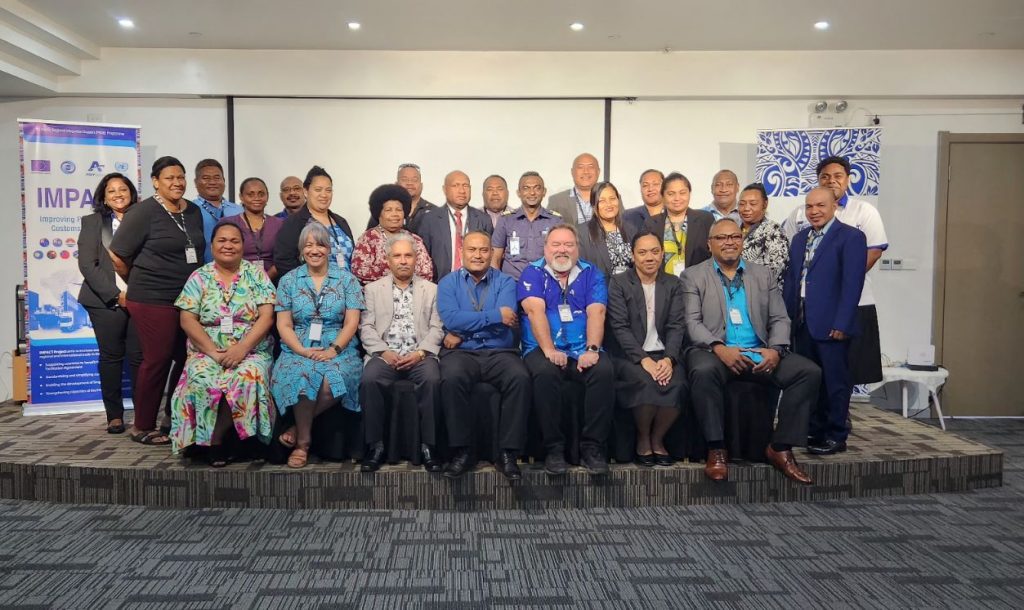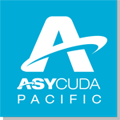Implementing streamlined and efficient customs procedures is essential for revolutionizing trade and driving economic growth across Pacific countries.
Last week, the Heads of Customs from 13 Pacific countries of the Pacific, African and Caribbean Partnership (PACP) countries convened to reshape the future of trade in the region.
The workshop, focused on re-engineering Customs Business Process, was organized by the Oceania Customs Organization (OCO) in collaboration with UN Trade and Development (UNCTAD) with support from the European Union-funded Improving Pacific Islands Customs and Trade (IMPACT) Project.
In his speech at the workshop, Mr. Erik Lindebo, the Team Leader for Development Cooperation and Partnerships at the European Union Delegation for the Pacific, remarked that the workshop was an enabler for “improvement of trade facilitation and customs/border procedures by OCO for its members.”
“We at the EU delegation are proud of your commitments and look forward to witnessing the positive impact of your efforts in the Pacific,” Mr. Lindebo added.
Prior to the workshop, the IMPACT Project completed a Legal, Procedural and Gender Gap Analysis. This Report evaluated national regulations against the standards set by the World Trade Organization Trade Facilitation Agreement (WTO TFA) and the European Union interim- Economic Partnership Agreement (iEPA).
The Gap Analysis report revealed critical insights into existing barriers to trade, highlighting gender disparities in the sector.
The workshop aimed to enable the revision of existing customs procedures and regulations, positioning these nations for transformative economic growth. Participants discussed the latest analysis of legal, procedural, and gender gaps within their customs administrations.
Participants explored innovative strategies and best practices aimed at streamlining customs operations.
Discussions centred on enhancing risk management, improving gender equality, and ultimately reducing trade costs to boost competitiveness on both regional and international platforms.
“We rely on manual methods which limits our ability to address other customs processes effectively. This in turn hampers our compliance with international standards,” she said.
Assessing Strengths and Weaknesses
The findings from the report painted a mixed picture: while seven out of twelve countries assessed so far showcased full compliance with modern legislation, the assessment identified several weaknesses.
Outdated policies and procedures, along with organizational structures that may hinder reform, emerged as significant challenges.
Despite these obstacles, the good news is all participating countries share a common automated customs system, the UN Trade and Development backed ASYCUDAWorld bolstered by capacity-building support from regional and international partners.
The Regional Coordinator of the UN Trade and Development’s, ASYCUDA Programme in Asia and the Pacific, Mr. Jayvee Santos, emphasized the critical role of efficient customs processes in fostering economic development.
Mr. Santos said, “the WTO TFA and iEPA present the Pacific with unique opportunities and challenges. Our commitment to reengineering our customs processes is not merely about compliance; it is about enhancing efficiency, transparency, and cooperation in our trade practices.”
“This system makes it easy to comply with international standards, collect customs revenue, save time and reduce paperwork.”
“Therefore, it is a win-win situation for the government, private sector and all operators,” Mr. Cian highlighted.
A Collaborative Path Forward
As the workshop progressed, participants were encouraged to actively share their experiences and collaborate on solutions beneficial not only to customs administrations but also to the wider trade community.
The goal was to create a more collaborative, efficient, fair, and prosperous trading environment for all stakeholders involved across the Pacific.
He further emphasized the continued commitment of the EU in promoting trade development in the Pacific.
With the outcomes of the gap analysis guiding their discussions, the participants planned ahead for a future where innovative customs practices could unlock new avenues for trade and economic growth across the region.
By working together, they aim to navigate the complexities of international trade while ensuring that their customs processes meet both regional and global obligations.
Mr. Santos further reminded the participants during the launch that, “automating customs services do not come without its challenges, there will be a period of adjustment and learning, however the benefits from the transformation are substantial in the long term.”
The workshop was facilitated in collaboration with the Pacific Islands Forum Secretariat, Trade Facilitation Coordinator, Mr. Stephen Muller, UN Trade and Development, Customs and Trade Facilitation Expert, Mr. Tevita Tupou, EY Global Trade Advisory Australia Lead Partner, Mr. Luke Branson.

© UN Trade and Development/ ASYCUDA Pacific
About ASYCUDAWorld: ASYCUDAWorld is a cutting-edge customs management system by UN Trade and Development, aimed at simplifying trade and customs processes.
About the IMPACT Project: Funded by the European Union, the IMPACT project seeks to enhance customs operations through technological advancements and capacity building.


